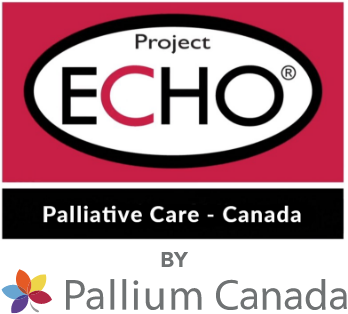Frequently Asked Questions


Questions:
- What is Project ECHO?
- What is the Palliative Care ECHO Project?
- Who is funding the Palliative Care ECHO Project?
- How does the Palliative Care ECHO Project work?
- What is Pallium Canada’s role?
- How does a health care professional participate in the activities of the Palliative Care ECHO Project?
- As a Project partner, what is in it for me?
- As a Project partner, will Pallium be playing a monitoring or oversight role in the work we are doing?
- Will virtual care consultations be a part of the Palliative Care ECHO Project’s programming?
What is Project ECHO?
Project ECHO (Extension for Community Healthcare Outcomes) has been recognized globally as a leading approach to improving patient care outcomes. There are ECHO partners in 40 countries, operating more than 860 ECHO networks, which have trained more than 140,000 professionals to date. Project ECHO was developed in 2003 at the University of New Mexico and is designed to create virtual communities of learners who are then able to provide better care to patients in their communities. The power of ECHO is in its approach to learning and collaboration. ECHO uses a “hub and spoke” education model to connect health care providers in communities (“spokes”) with teams of specialists and experts at regional and national centres (the “hub”) to increase knowledge and skills to provide better care to patients and families.
What is the Palliative Care ECHO Project?
The Palliative Care ECHO Project is a 5-year national initiative that supports the creation of communities of practice, supporting continuous professional development among health care providers across Canada who care for patients with life-limiting illness. Led by Pallium Canada and partners from across Canada, the Project will deliver a continuous learning journey for health care providers to build local capacity to provide a palliative care approach to patients and their families.Who is funding the Palliative Care ECHO Project?
The Palliative Care ECHO Project is supported by a financial contribution from Health Canada.
How does the Palliative Care ECHO Project work?
The power of ECHO is in its approach to learning and collaboration. ECHO uses a “hub and spoke” education model to connect health care providers in communities (“spokes”) with teams of specialists and experts at regional and national centres (the “hub”). The creation of hubs is the anchor of the overarching model and exists to be more responsive to local, regional and provincial, or sector-specific needs. The spokes represent the various communities (e.g., family health teams, paramedics) and settings of care (e.g., long-term care residences, home care) that are served by a hub. The health care professionals who work within these spokes are the beneficiaries of the various palliative care educational interventions created by the hub and by Pallium that will enhance their learning and practice.
What is Pallium Canada’s role?
Pallium Canada’s role is to coordinate the system of hubs and spokes across Canada, curate and develop content to support hub partners and their spokes in meeting their local needs, deliver national palliative care programming, and lead the overall evaluation of the Project’s impacts and reporting on key ECHO metrics to hub partners and funders.
How does a health care professional participate in the activities of the Palliative Care ECHO Project?
All health care professionals affiliated with a hub will be able to participate in the hub’s ECHO sessions. These are health care professionals who may work directly for the hub or who are members/stakeholders of the hub. The key to ensuring that stakeholders are aware of upcoming ECHO sessions is to make sure there is a promotion plan in place across various platforms that a hub may use to communicate with their audience (website, newsletter, social media, email blasts, portal, etc.).
In addition, all health care professionals will be able to participate in the national programming of the Palliative Care ECHO Project. The Project is designed to create virtual communities of learners by bringing together local health care providers (and community leaders) with regional, provincial/territorial, and national subject matter experts for training, deep dive learning opportunities, brief lecture presentations, and quality improvement discussions, fostering an “all learn, all teach” approach. A bank of educational resources will also be maintained by Pallium Canada for o0 demand access by health care professionals.
As a Project partner, what is in it for me?
The Palliative Care ECHO Project is an opportunity for your stakeholders such as health care professionals, to acquire new knowledge and information that will help them provide better, more timely, high quality palliative care to patients and their families. In addition, you will raise the profile of the amazing work your team is already doing in relation to palliative care and contribute to a larger base of health care professionals who can integrate a palliative care approach into their daily practice. Your involvement as a partner of the Palliative Care ECHO Project will contribute to:
- Raising the profile of your palliative care capacity building efforts on a national scale;
- Getting your planned capacity building activities up and running and having the Project’s support to grow and scale;
- Building relationships with organizations and institutions across the country to share expertise and advice;
- Your team accessing Project programming (e.g., webinars, activities, workshops, etc.) for free, when and where they need it;
- More health care providers (across professions and settings of care) in your region who integrate the palliative care approach into their practice to provide timelier palliative care;
- A larger network of health care providers who engage in knowledge development and sharing, and spreading tools and resources related to providing a palliative care approach to their patients;
- Increasing opportunities for health care professionals, especially those in rural and remote parts of the country, including those serving Indigenous communities, to access specialist-level
palliative care virtual learning and just-in-time clinical supports as needed; - Increasing numbers of specialist-level palliative care teams equipped with technology and skills to allow them to provide appropriate virtual clinical and teaching support to health care professionals in their regions; and
- Enabling more health care professionals across the country to be able to access quality improvement (QI) tools to undertake QI in their workplaces and regions.
As a Project partner, will Pallium be playing a monitoring or oversight role in the work we are doing?
Pallium and the Palliative Care ECHO Project will not be replacing or reviewing the current work you are doing. The ECHO programming — including national programming and hub programming — curated and developed through the Palliative Care ECHO Project will be driven by the needs of hub partners and their stakeholders and will be complementary to the great work that is already happening across the country as it relates to palliative care. Additionally, the Palliative Care ECHO Project’s approach to building a bank of on-demand educational resources will be to; source, vet, and curate content from a number of different providers; repurpose content that has already been developed; and where required, create new content to meet the learning needs of the partners and communities it serves. This approach could help minimize duplication of effort across the country. For example, if a resource that was developed in British Columbia meets a partner’s need in another part of the country, with some minor edits to reflect regional/sector differences, time and resources will have been saved for the partner, and British Columbia’s initiative will benefit from greater traction and uptake of its work—a win-win proposition.
